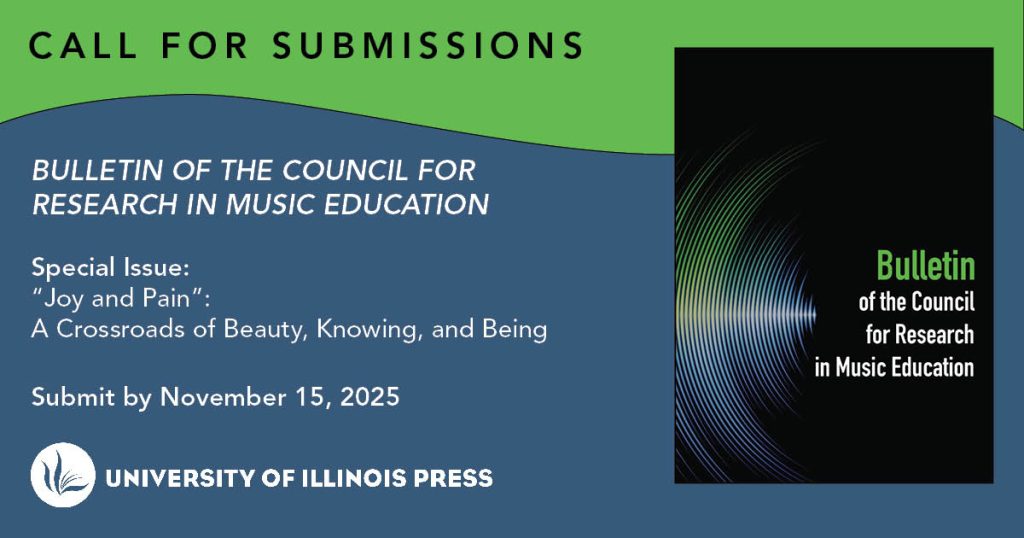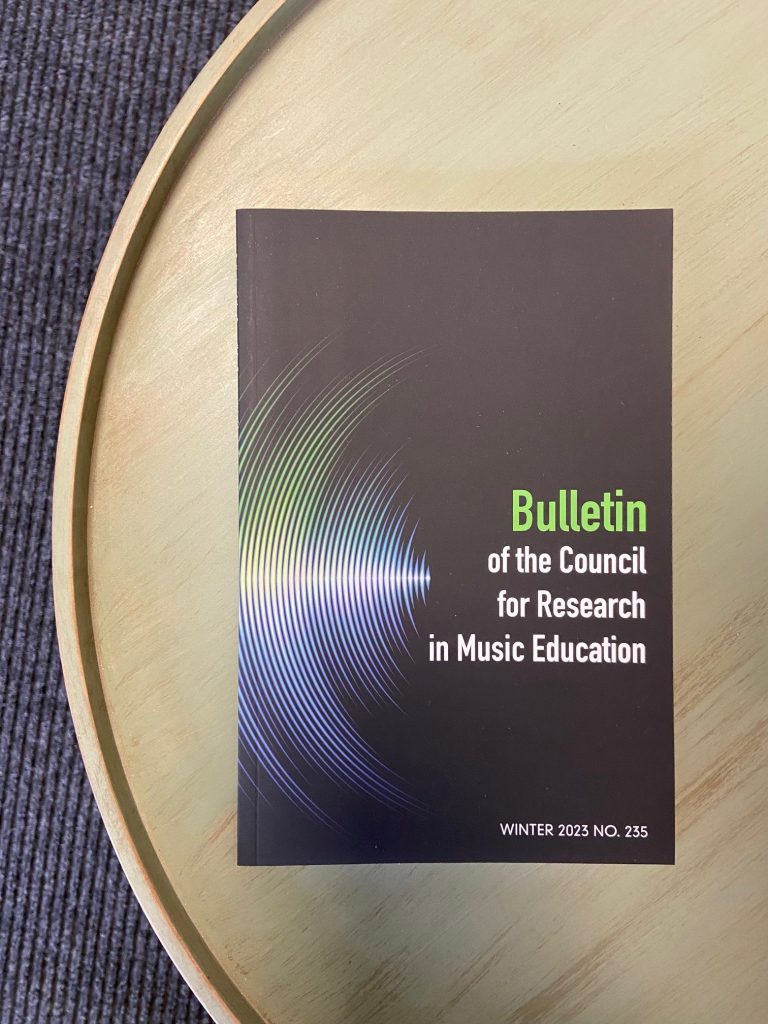Calling all music educators! The Bulletin of the Council for Research in Music Education is putting out a call for papers to be featured in an upcoming special issue Black Joy/Pain in Music Education. Read more about the issue below, plus check out a reading list of temporarily free to access articles discussing the experiences of Black music educators and the inclusion of historically Black genres in music curricula.
The Bulletin of the Council for Research in Music Education provides a forum where contemporary research is made accessible to all with interest in music education. The Bulletin contains current research, and reviews of interest to the international music education profession.

Call for Papers: “Joy and Pain”: A Crossroads of Beauty, Knowing, and Being
The group Maze—also known as Maze featuring Frankie Beverly–is a soul and funk band founded in Philadelphia in 1970 by Frankie Beverly. While Maze’s music reached a wide range of listeners, their music persists as an iconic soundtrack of the Black experience. There is probably not a Black family function (i.e., baby shower, birthday, graduation, wedding, reunion, or cookout) or Historically Black College and University gathering that has not included the music of Maze in its song rotation. Maze released a total of eleven albums, nine of which achieved gold status. Joy and Pain, the group’s fourth album, was a masterful work that highlighted the highs and lows of the human condition. From songs such as “Changing Times” to “Family” to “Southern Girl,” Maze constructed a sonic space to celebrate, address, and encourage efforts to identify and overcome life’s challenges, including but not limited to systemic obstacles that sit on the horizon.
In the song “Joy and Pain,” Maze nuances joy and pain as codependent variables of our personal and social selves, temporary and sometimes ephemeral, and salient features that assist in the manifestation and cultivation of self. Maze’s lyrics (such as “joy and pain are like sunshine and rain”) illuminate an existential tension akin to Du Bois’ description of his double consciousness theory. Historically racialized individuals and communities are aware of how their personal and social selves can be shaped by how they see themselves and how the world sees them otherwise.
Like that of many of their contemporaries, Maze’s music also engaged and inspired other systemically marginalized communities to not only resist erasure and oppression, but also to celebrate their beauty, knowing, and being, three salient features of the human condition. These features correspond with three key pillars of philosophy (ontology, epistemology, and axiology), which address fundamental questions about one’s existence, knowledge, and values.
The aim of this special issue is to welcome historically racialized scholars whose work and inquiry center on the lived experiences, innovations, and inventions of historically racialized people to share their work. This issue also invites non-racialized scholars who have partnered with historically racialized individuals to also submit their work. Sustained collaborations, prior to this call, are of particular interest. Lastly, and in keeping with the aim of their music, we encourage those submitting to consider how Maze might articulate the joy and pain of historically racialized folk in their work.
Submission topics may include but are not limited to:
- Employing frameworks belonging to historically racialized people to examine, analyze, and critique contemporary issues in music learning and teaching and the profession broadly
- Examining “Black boy joy” and/or “Black girl joy” among Black K–12 students to reconceptualize past and current pedagogical approaches in music learning and teaching
- Centering philosophical approaches by historically racialized scholars to (re)imagine and reposition policy, practice, and inquiry in music education
- Illuminating preK–12 or collegiate partnerships created to address and improve the lived experiences of historically racialized students and their communities in music education and broadly
- Investigating how historically racialized individuals negotiate identity politics in music spaces or the field of music education broadly
- Conceptualizing healing through music among historically racialized people and the trauma they experience in music learning and teaching spaces
Submission Deadline for Special Issue: November 15, 2025.
For inquiries, contact: joyce.mccall@asu.edu

Recommended Reading
Free from May 1, 2025, to July 31, 2025: “Three Black Gospel Music Experts on Preparing, Teaching, and “Being” in the African American Aural-Oral Tradition” by Whitney A. Covalle (No. 233)
The purpose of this multiple case study was to gather musical and nonmusical perspectives from three experts on teaching Black gospel music in the African American aural-oral tradition. Research questions included: (a) What is the process Black gospel music experts engage in when preparing for and teaching gospel music in the aural-oral tradition? (b) In the view of Black gospel music experts, how does race intersect with the preparation, teaching, and performance of gospel music? (c) How do Black gospel music experts advocate for incorporating gospel music into public school vocal music programs?
Free to access from August 1, 2025, to October 31, 2025: “Discovering Unwavering Love: The Power of Community and Possibility in the Life Trajectory of a Black Gay Band Director” by Donald M. Taylor, Crystal Lynn Gerrard, and Stephen (No. 242)
In this narrative study, the authors share Stephen’s story of growing up Black and gay in a predominantly White Southern neighborhood to become an award-winning band director. From five semistructured interviews, photo analysis, and text messages, they identified five primary themes: pathways paved, school mentors, being outed, expanding horizons, and forging new paths. Findings illustrate how extended family networks can function with nuclear family to provide multiple forms of capital and a path for self-actualization.
Free to access from November 1, 2025, to January 31, 2026: “Outside in the Music Teaching Machine: Remembrances of Marginalization” by Sean Rober Powell and Celeste (No. 223)
In this article, Sean Rober Powell shares stories of Celeste, an African American woman navigating the predominantly White, male world of band teaching. Through a collaborative post-qualitative inquiry, her experiences are presented in a rhizome, joining with Spivak’s concept of the deconstruction of marginality. Celeste’s story highlights the ways in which she is marginalized through difference from the hegemonic center. Through this project, the authors hope to share experiences that might resonate with other women of color working in the music teaching machine as they build a community of peers.
Free to access from February 1, 2026, to April 30, 2026: “Secondary Choral Music Educators’ Usage of African American Spirituals in American Music Classrooms” by Michelle Z. Gibson (No. 243)
Given the unique combination of West African and Eurocentric musical characteristics found in the genre, spirituals require different pedagogical considerations than music of the Western classical art tradition, which has most closely been associated with formal American ensemble music learning. In this exploratory pilot study, a questionnaire was disseminated to American middle and high school choral directors to compare their priorities concerning literature selection, performance considerations, pedagogical tools, and sources of pedagogical knowledge for teaching African American spirituals.
Find Out More:
- Individual Subscriptions can be made through the University of Illinois Press website.
- To recommend this title to your library, fill out this Library Request Form.
- Ready to see your work featured in Bulletin of the Council for Research in Music Education? Submit original scholarly work here.
- Check out our other music journals: American Music, Ethnomusicology, Jazz and Culture, and Music and the Moving Image
